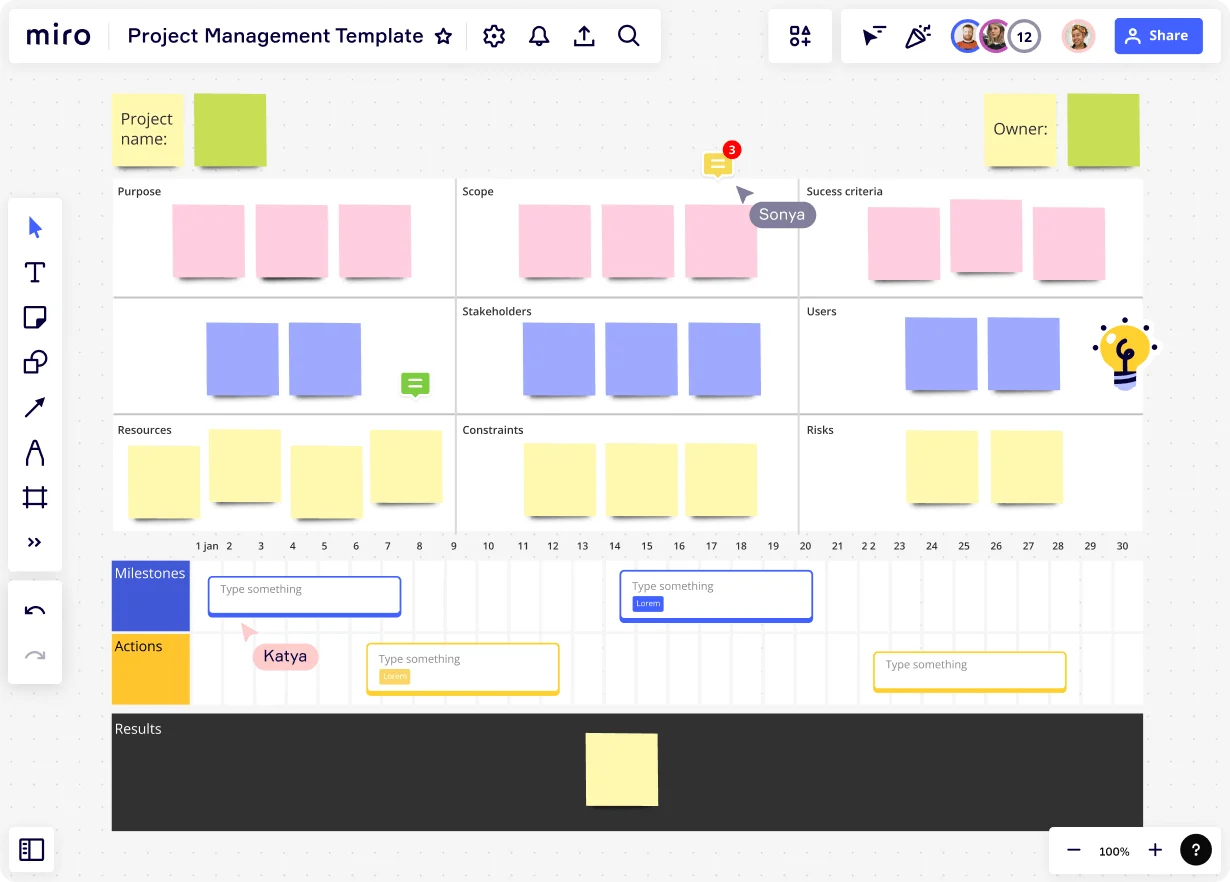
Table of contents
Table of contents
What is risk in project management?

Summary
In this guide, you will learn:
- What project risk means: potential events impacting objectives, requiring proactive handling
- Importance of risk management: process to anticipate, analyze, and plan responses, reducing uncertainty
- Five main project risks: including scope creep and resource shortages, and mitigation strategies
- Key steps in risk management: identification, assessment, response planning, and continuous monitoring
- Tools and techniques: risk registers, matrices, SWOT, Monte Carlo simulations
- Role of collaboration and visualization: enabling better decision-making and adaptation
Try Miro now
Join thousands of teams using Miro to do their best work yet.
What is risk management?
Risk assessment is a way to find, sort, and rank possible problems that could affect the project. It looks at how these issues could change the plan, cost, or goals. When project managers know about these problems early, they can make plans to handle them. This helps the project run smoothly and increases the chance of success.
Risk management is an important tool in project management. It involves anticipating possible problems that could derail the project's objectives, and planning for actions to either prevent the risk from occurring or minimize its impact if it does occur. Essentially, it's a proactive approach to problem-solving, enhancing the overall success and predictability of projects.
5 main risks in project management
Let's take a look at the five main risks of project management and how to mitigate them:
1. Scope creep
This risk refers to uncontrolled changes or continuous growth in a project's scope. It's one of the most common risks and can lead to projects exceeding their planned resources, time, or budget.
How to mitigate it?
Through proper project planning and management, project managers can mitigate the risk of scope creep. Setting clear objectives, and communicating them clearly to stakeholders to get their buy-in, and regular check-ins and updates are just a few foundational ways of ensuring that the project will be focused on the pre-set goals.
2. Resource shortages
These can include both human resources and material resources. Key personnel may leave the project or organization, or critical materials might not be available when required, which could delay the project.
How to mitigate it?
While you can't predict operational changes, it's important that the team is well equipped to adjust to changes when they happen. This can involve the tool stack used that ease the transition when personnel leave the project, constant training etc.
3. Budget overruns
Projects can face the risk of costs spiraling beyond the allocated budget due to unexpected expenses, poor cost estimating, or scope creep.
How to mitigate it?
This is why it's important to plan the resource allocation thoroughly before the start of the project, and calculate the cost estimations as accurately as possible. For that, project managers can use past projects as a source of information for better planning.
4. Time delays
Projects can suffer from time delays due to a variety of reasons including, but not limited to, inefficient processes, task dependencies, underestimated task duration, or resource shortages.
How to mitigate it?
As a basic rule, it's better to overestimate the time needed for certain project stages, rather than overcommit to delivering them sooner. The utilization of a Gantt chart or Timeline tool can facilitate better tracking and ensure alignment with the project schedule.
Further, past projects should not be overlooked as they can provide valuable insights for future tasks. Drawing on experiences from completed projects can enhance the precision of estimates and task durations, leading to more effective project planning."
5. Inefficient communication
Effective communication is critical in project management. The risk of communication breakdowns, be it within the team or with stakeholders, can lead to misunderstandings, misaligned expectations, and project failures. The result of inefficient communication is the lack of clarity among the project team and even stakeholders, which leads further on to a chain of other issues.
How to mitigate it?
It's often best to lean towards over-communication rather than risking a lack of information flow. Regularly providing progress updates and soliciting feedback can help set clear expectations among the team and stakeholders. Additionally, periodically revisiting and reinforcing the project goals keeps everyone aligned and focused, preventing deviations from the primary objectives.
Each of these risks is manageable with proactive risk management strategies, constant communication, and regular review of project progress. As a project manager, being cognizant of these risks can help mitigate their impact on the project's timeline, budget, and quality.
Easily manage projects in Miro
Having an intuitive tool goes a long way in mitigating project risks. Miro makes project management easy with powerful features for Agile workflows, integrations with popular tools, and seamless collaboration for remote and hybrid teams. Sign up to get started.
Author: Miro Team
Last update: October 16, 2025